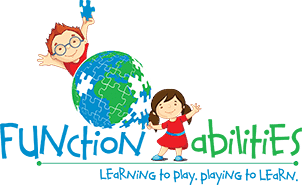 Speech-Language Pathologists (SLPs) are specialists trained in the many areas of communication. It may surprise most people how broad the field is and the many benefits of speech therapy for children. SLPs provide specialized therapy for speech articulation, language, voice, fluency, feeding, and social/pragmatic skills. What do each of these mean exactly?
Speech-Language Pathologists (SLPs) are specialists trained in the many areas of communication. It may surprise most people how broad the field is and the many benefits of speech therapy for children. SLPs provide specialized therapy for speech articulation, language, voice, fluency, feeding, and social/pragmatic skills. What do each of these mean exactly?
Articulation and Phonology
Articulation and phonology refer to the production of specific speech sounds or classes of sounds. For example, many children produce /w/ rather than /r/, or move their tongue past their teeth producing /th/ rather than /s/. This falls under the category of “Articulation”. Some children may have difficulty with entire classes of sounds, producing all sounds in the front of the mouth (so /t/ becomes /k/), or leaving one sound off of a cluster of sounds (/poon/ instead of /spoon/). These are phonological errors. An SLP can increase your child’s intelligibility; how much of their speech is understood by others.
Language
Language is divided into receptive, or what a child understands, and expressive, or what a child is able to say. An expressive delay occurs when a child isn’t talking as much as they should be at a certain age. A two-year-old who only speaks 10-20 words would benefit from speech therapy. If you feel your child doesn’t seem to understand what they hear or you find you have to rephrase things for them to understand, your child may have a receptive language delay. For example, if you say “Give me the red crayon” and they hand you the blue crayon. Some children have both expressive and receptive language delays at the same time. An SLP can help your child develop the language skills needed to answer questions, follow directions, and participate in conversations.
Fluency/Stuttering
Stuttering or dysfluency occurs when there are breaks in the flow of speech. So a child may pause, repeat sounds, etc. Some children have other behaviors associated with dysfluent moments including: tics, facial grimaces, and tension. An SLP will help a child manage these dysfluent moments in order to increase fluent speech.
Voice
Voice disorders occur when there is a problem with the vocal folds which produce sound. This could mean a nodule on the vocal fold itself or paralysis of the vocal folds. Symptoms typically include hoarse voice or loss of voice. An SLP may make recommendations such as: not yelling or talking too much. If there is a structural cause for voice problems, surgery may be required. An SLP can provide therapy following surgery to assist in regaining a normal speaking voice.
Social/Pragmatic Language
Some kids need help with social and pragmatic skills such as having a conversation, understanding emotions and feelings, and nonverbal communication. SLPs can provide instruction to improve these skills so that the child can participate in successful conversations with others.
Swallowing/Feeding
SLPs also provide therapy for feeding and swallowing issues. Children as young as newborns may be seen by an SLP for assistance with latching on or suckling. Older children may need to increase the number and types of food they will eat. Some children have structural problems such as a cleft palate and need speech therapy to assist with feeding skills following surgery.
Why does my child need to see a speech-language pathologist?
Your child could receive speech therapy services for any of the areas defined above. An SLP is specially trained in all of these areas of communication and can help your child improve these skills so that they are better able to communicate with others and function effectively in all environments. Be wary of therapists who are not seeing your children frequently enough to help them make quick and lasting changes.
For more information on any of the disorders related to speech and language, visit www.asha.org.
Contributed By: Rachel Jacob, CCC-SLP
